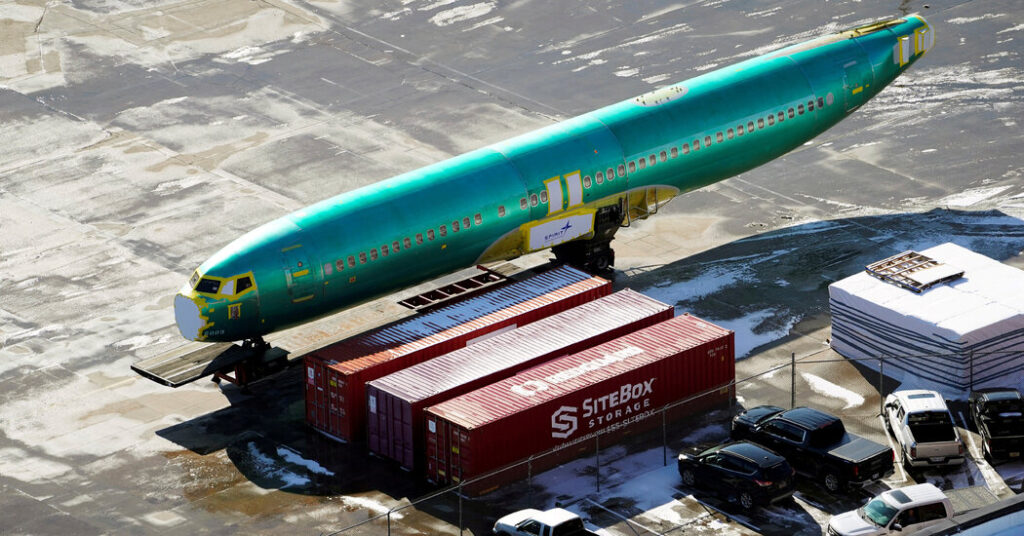Boeing said Monday it had agreed to buy key supplier Spirit AeroSystems, ending a nearly two-decade experiment in outsourcing production of key components for commercial jets, including the 737 Max airframe and parts for the 767, 777 and 787.
By buying Spirit, Boeing hopes to halt quality problems that have plagued the supplier in recent years. It already has significant influence over Spirit, but owning the company will give it more control over and change production methods. Boeing has also taken internal steps to improve quality after a disastrous accident in January that caused a panel to blow off during flight.
Reintegrating Spirit will allow the company to “fully align” its production and safety systems with its employees, Boeing CEO Dave Calhoun said in a statement.
The widely expected deal was valued at $4.7 billion in stock and $8.3 billion including Spirit's debt. The deal requires approval from regulators and Spirit shareholders. Boeing will also sell a portion of Spirit to European rival Airbus as part of the deal. Boeing said it expects the Spirit acquisition to close by the middle of next year.
The acquisition marks a strategic shift for Boeing, which began relying more on independent suppliers in the early 2000s to cut costs and improve profits. Spirit was founded in 2005 during a push toward outsourcing, when Boeing sold its Wichita, Kansas, unit and an Oklahoma facility.
In addition to its work for Boeing, Spirit makes parts for Airbus, Bombardier, Lockheed Martin, Northrop Grumman and Rolls-Royce, among other aerospace companies. Boeing accounted for 64% of Spirit's net revenue last year, and Airbus 19%. Boeing offered to buy Spirit for $37.25 a share, 30% higher than Spirit's stock price in late February, before the companies announced they were in talks.
Spirit's quality problems led to a management shakeup last fall that brought in Patrick Shanahan, a former Boeing executive and former senior Defense Department official, as chief executive. At Boeing, Mr. Shanahan was seen as an effective executive who could quickly turn around troubled programs and divisions. He is the leading candidate to succeed Mr. Calhoun, who is due to retire at the end of the year.
But Boeing has also had quality problems. The company has faced intense scrutiny since a panel on a 737 MAX 9 jet blew up shortly after takeoff on an Alaska Airlines flight on Jan. 5. The panels, called door plugs, are meant to plug gaps in unneeded emergency exits.
News of the Spirit agreement came hours after reports that federal authorities plan to offer Boeing a plea deal in a fraud case linked to two deadly crashes that killed 346 people more than five years ago.
No serious injuries were reported in the January incident, but the consequences could have been far more severe if the panel had blown off at high altitude while passengers were moving about the plane. The National Transportation Safety Board said the plane appears to have left the Boeing factory without the bolts needed to secure the plug, and the company said it had found no records of that work. The plug had been removed so Spirit workers could make the repairs.
In response, Boeing has made several changes in recent months, expanding training, streamlining plans and processes, and strengthening inspections at its 737 factory in Renton, Washington, and at Spirit Airlines, the company said. And since March, it has stopped accepting 737s from Spirit Airlines that don't fully meet Boeing's standards, rather than accepting defects that can be fixed later in order to keep production going.
The change has paid big dividends, Boeing's chief quality officer, Elizabeth Lund, told reporters at the factory last week: It has significantly reduced the number of critical defects Boeing has to fix and allows the company to assemble the Max planes more quickly once they arrive at Renton, she said.
Boeing also said it is seeking to reduce the practice of performing manufacturing operations out of sequence, known as move operations. While some move operations are considered necessary, too many of them can disrupt the complex process of building airplanes and lead to defects and workmanship.
At the press conference, Land also revealed new details about how the plane involved in the January flight left the factory with a door plug that was not fully secured. After the plug was removed to perform a nearby repair, workers prepared the plane for moving outside and replaced the unbolted plug, which Land said was not the team's fault.
Lund's disclosure of the new information, along with other comments at the briefing, infuriated the NTSB, which criticized Boeing for violating rules about talking about ongoing investigations.
Boeing apologized to the safety board and acknowledged that it “exceeded its role as an investigative resource.”

